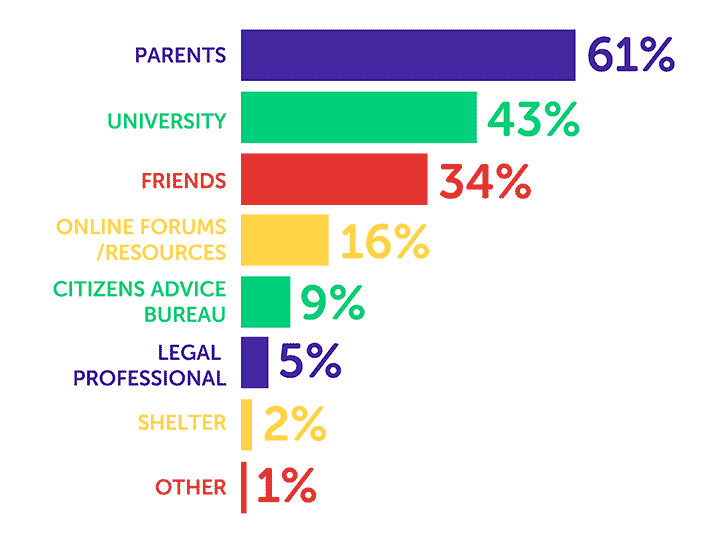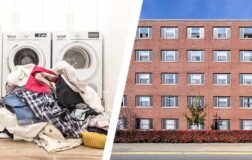National Student Accommodation Survey 2021 – Results
UPDATE: View our 2024 National Student Accommodation Survey.
This year, more than ever, student accommodation has been a topic of concern, anxiety and confusion for so many. Our latest survey reveals the realities that students are facing.
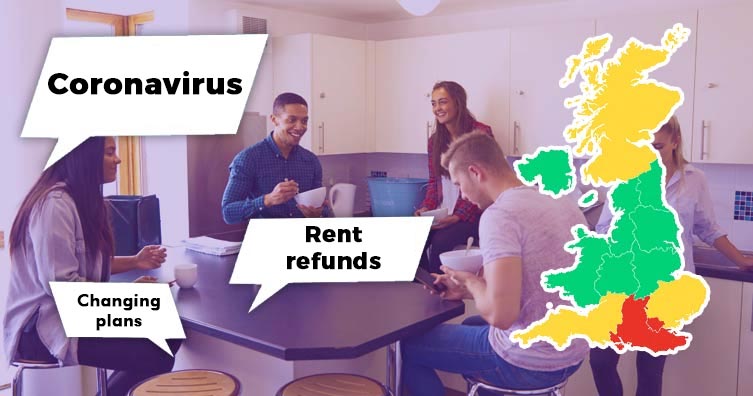
Credit: Monkey Business Images (background) – Shutterstock
The National Student Accommodation Survey explores issues related to students' living situations each year. But in the five years that we've been running this survey, we've never known the reported problems to be quite as disruptive as they have been in 2020/21, a year dominated by COVID-19.
The coronavirus pandemic has hugely shaped students' experiences and decisions related to their accommodation. In fact, for many, key choices like where they live during term time have been out of their control, with the rules of national lockdowns requiring the majority to stay at home and study online.
In our 2021 survey, over 1,300 people responded from across the UK, providing insight into just how difficult it's been to manage student accommodation this academic year.
What's in this report?
The impact of coronavirus on student accommodation
It was evident from our recent survey on the impact of COVID-19 that the pandemic has affected students' accommodation choices – but the extent to which it has shaped, and continues to shape, their decisions around where they live has not been clear until now.
What's more, the survey results provide an indication of just how much has been spent on unused student accommodation this year. Read on for this, along with many more fascinating findings from this year's National Student Accommodation Survey.
Students' housing choices at the beginning of 2020/21
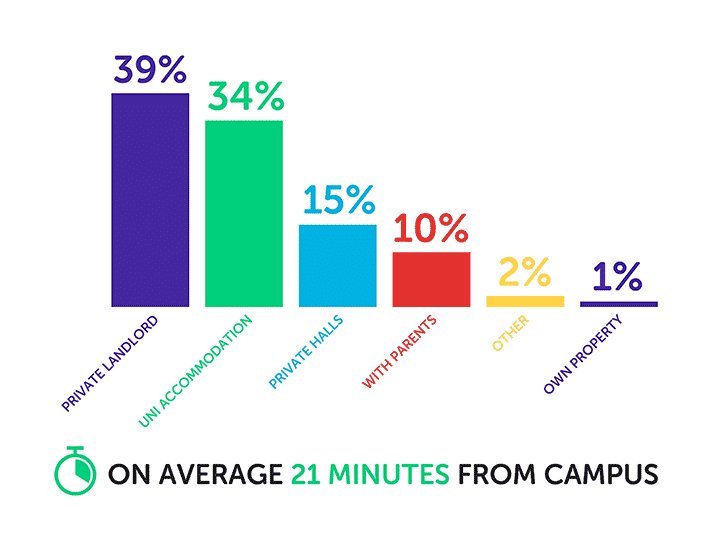
Compared to the previous year, at the start of 2020/21 there were actually fewer students living with their parents or guardians, down from 12% to 10%.
With only one in 10 students at home, the majority were either living in university halls or in a property with a private landlord, with a further 15% in private halls.
But, when we asked students where they were currently living, the results were quite different...
Students' living situations in the Spring Term 2020/21
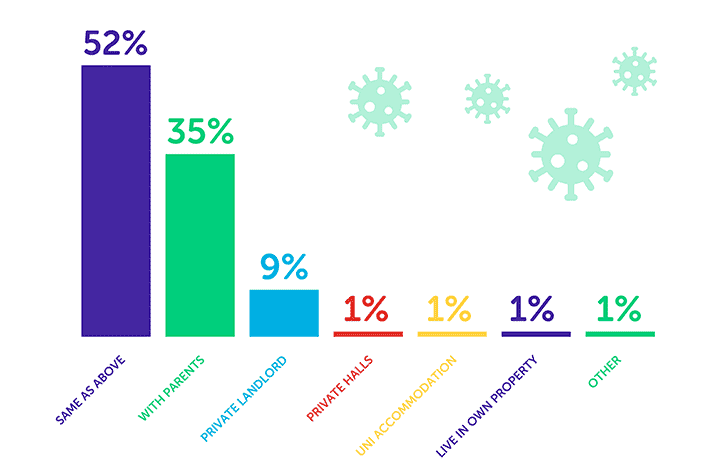
After the Christmas break, 52% were still in the same living situations as originally planned. But, a third of students in the survey had moved back home to live with their parents or guardians.
In any other year it would be extremely surprising for so many students to move back home for the second term. This year, though, it was almost inevitable.
In December 2020, the government allocated several days for a 'student travel window' in which students could return home for Christmas.
However, after many students had returned home, restrictions were then put in place that required them to 'stay at home' unless they were studying one of a handful of courses that were allowed to continue with in-person teaching, like medicine, dentistry, veterinary science, initial teacher training, policing and social work.
On top of this, some students may have already made the decision, separately from the government's restrictions, to move back home if their courses were being taught entirely online.
Perhaps unsurprisingly, a large proportion of students have been unable to spend the entire academic year so far in their rented accommodation.
How much time have students spent in their rented accommodation in 2020/21?
Although around 42% of students in the survey have been able to spend the entire time in their properties, 43% have spent three months or less there.
Unfortunately, our survey has also found that, had students known what would happen this year, over two in five would have chosen their accommodation differently.
What are students' plans for accommodation in 2021/22?
Here's when students told us they've started, or will start, looking for next year's accommodation:
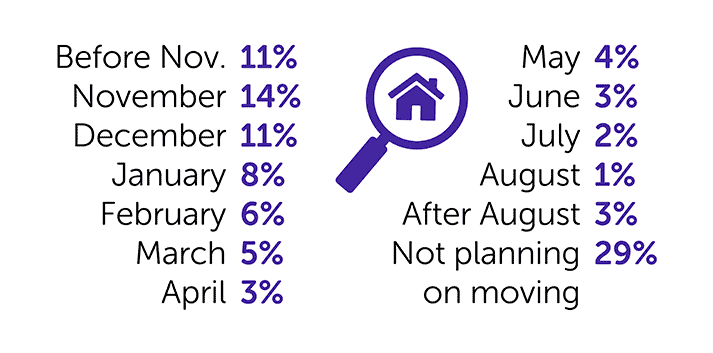
Given the disruptions of this past year, along with the limited contact many would have had with their classmates, it may be expected that students would start househunting later than usual (if at all). But, interestingly, this doesn't seem to be the case in any significant sense.
Last year, 11% told us that they had started looking before November, with 17% looking in November and 10% looking in December – noticeably similar to this year, other than a 3% decrease in students looking in November.
In addition, the same proportion (29%) had told us last year that they weren't planning on moving, so this figure hasn't changed.
Have students signed rental contracts for 2021/22 yet?
As well as asking students when (or even if) they would start looking for accommodation next year, we also asked whether they had yet signed tenancy agreements for 2021/22:
- 41% – Haven't signed their next contract, but will do
- 30% – Haven't signed their next contract, and aren't planning to
- 28% – Have signed their next contract.
Just under one in three students in the survey have already agreed to rent a property next year, even though it's still not fully clear how much in-person teaching there will be in 2021/22.
Student rent refunds due to coronavirus

Among all students in the survey who pay rent, around two in five asked for a refund – but there was a noticeable difference between the numbers of students asking for rent rebates in halls, and those asking for rebates with private landlords.
In university accommodation, as many as two-thirds had asked for a refund. This compares to just under one in five students with private landlords who had made the same request.
Overall, around a third of students in the survey were offered a refund on rent, with 9% offered a full discount, and 23% offered a partial one.
Breaking this down, 63% of students in university accommodation were offered a discount (full or partial) and 32% in private halls were offered one. However, only 6% of students with private landlords were offered a discount.

Per person, the average partial rent discount was £75 per week.
Based on calculations from the results, taking rent refunds into consideration, we have found that students who haven't had full access to their uni home have spent an average of £1,621 on unused accommodation.
We have then made further calculations, and from these sums, we can estimate that across the whole UK student population, £933,270,890 (yes, nearly £1 billion!) of rent has been spent on rooms that have been sitting empty so far this academic year.
We calculated this figure using student rent (after any discounts/refunds) and the number of months unable to access the property. Averages are then calculated for each accommodation type and combined with HESA student accommodation data to give an overall figure.
Students' experiences with getting money back from housing providers and landlords have varied widely:
- The refund is only for a six-week period, not the entire duration I haven't been able to use the accommodation. (Uni accommodation)
- Refunded us for [the] reduction in bills they've had as bills are included, but that's minimal and we're still paying for accommodation the government have stopped us living in despite being in private accommodation where we wouldn't meet with anyone else. (Private landlord)
- The refund policy due to COVID was not explained in full and [it] took a few months to complete the admin to add my discount to 2021 as I paid in advance. (Private halls)
- They've been very understanding. For every week we couldn't be on campus due to COVID, we got a 100% accommodation refund. (Uni accommodation)
- We should be given a full refund, but have only been given half a refund for two months. And I've been unable to live in accommodation for about four months, and won't move back after either. (Uni accommodation)
- I understand from a business point of view that they can't give refunds to everyone for conditions beyond their control, which is why I think they've handled it perfectly despite others disagreeing. (Private halls)
- Instead of case-by-case and taking into account medical students who need access to labs, they have applied a blanket approach which means we miss out on a refund. December has also been forgotten as we had been told to leave within a travel window at the beginning of the month. (Uni accommodation)
- I wish they could have [given] us the option to get a refund on rent if we moved out. (Private landlord)
How much does student accommodation cost?
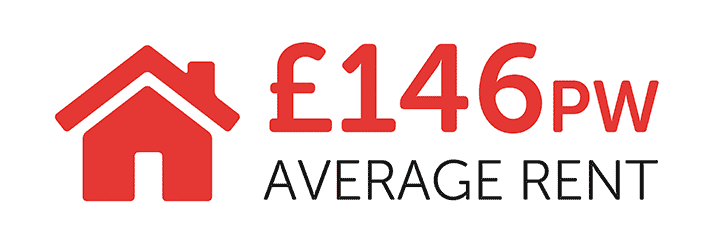
As would be expected, London has the highest average student rent in the UK. However, rent in the South East and South West is not far behind. In the case of Northern Ireland, there wasn't sufficient data to provide a reliable figure.
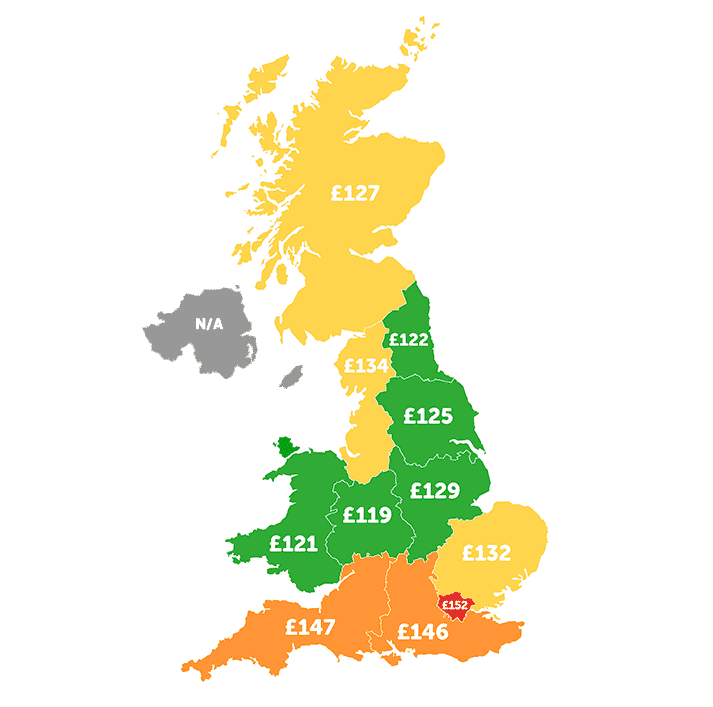
Is the Maintenance Loan enough to cover rental costs? Here's what students in the survey told us:
- It's cold. We have to do lectures at home but don't have enough money in our allowance to cover [these] additional costs. It makes it very hard to sit at a desk. (Private landlord)
- In these circumstances it's increasingly hard to stay positive when paying for accommodation you aren't allowed to use. Accommodation is so expensive and those not getting the full loan have to pay the same costs as those that do, it's just unfair. (Private halls)
- Fear of not being able to afford living costs e.g. food, travel, academic resources as Maintenance Loan doesn't cover both rent and living costs and I receive no [help] from family. (Uni accommodation)
- Based on the restrictions because of COVID, none of the faculties minus your actual bedroom and kitchen are open so you're going to be trapped. The costs are high considering what you are getting, especially in a time where people can't work or have lost their jobs. (Private halls)
Which accommodation is cheapest?
| Living arrangements | Average weekly rent |
|---|---|
| With parents/guardians | £30 |
| Private halls | £144 |
| Uni accommodation | £145 |
| Private landlord | £148 |
Interestingly, for students in private halls, uni halls and properties with private landlords, the average cost of rent is very similar.
But the figures have increased slightly for each of those types of housing since last year.
The biggest increase is for properties with private landlords, up from an average of £136 a week in 2020. It may not seem like a huge rise, but if the rental costs continue to go up for students, accommodation is at risk of becoming yet more unaffordable.
On the other hand, the average cost per week for students who live with their parents or guardians has gone down by £23 since last year. It's possible that parents and guardians are expecting smaller contributions for rent, food and bills during the pandemic – particularly as 25% of students have lost some income due to COVID-19.
What do you get for your money?
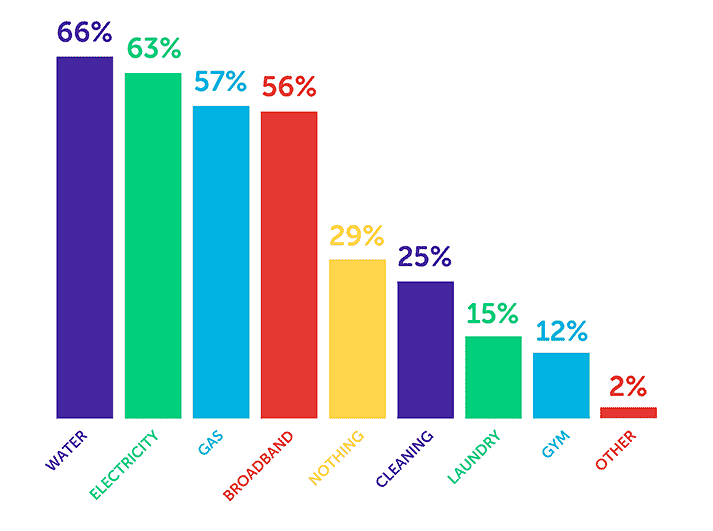
For around two-thirds of students, rent includes at least one type of utility. And, among the bills that are included, water, electricity, gas and broadband are by far the most common.
The figures are generally pretty similar to those that we've seen in previous years. But, there has been a steady increase in students telling us that a gym is included in their rent.
In 2019, 8% said that access to a gym was included. This then increased to 10% in 2020, and has gone up a further 2% this year to 12%, suggesting a general improvement in facilities in blocks of flats.
What else do you have to pay for?
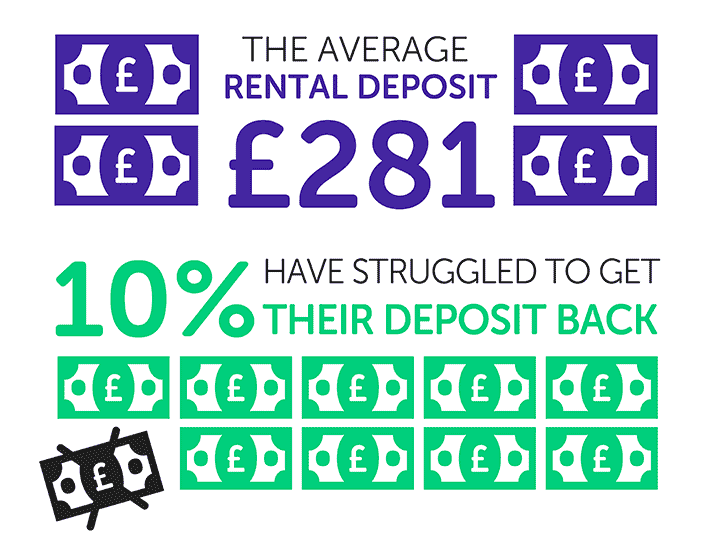
On average, students pay an average deposit of £281 – a very similar figure to last year, when it was only around £1 higher.
10% of students in the survey told us that they've had problems getting their deposit back. The good news is that this is down by 4% from last year.
Before shelling out the cash, how many students are taking the time to read through their tenancy agreement?
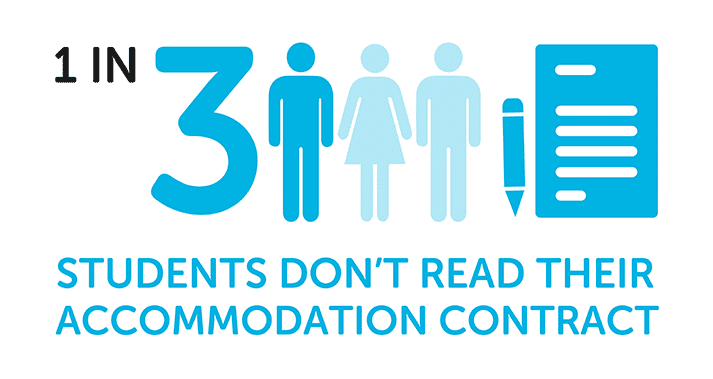
Alarmingly, for just over one in 10 students, no one in the house read the contract before signing.
Students expressed mixed views about how far their rent went:
- Most of the residents are working class (like myself) and the facilities are amazing (especially the gym and the large bar area). The staff are also extremely reassuring and friendly. (Uni accommodation)
- It's so expensive for what you're actually receiving. Letting agents and landlords pressure students to pay deposits so that they don't risk losing out on that property, without allowing them to read/negotiate any terms or contracts. (Private landlord)
- We still have to pay full rent but we don't have access to the communal kitchen, communal areas, cinema room or gym. (Private halls)
- I needed my own place to study as I have disabilities and it's easier to live alone in an accommodation that has the right layout for me, although it's difficult to find affordable accommodation that suits my needs so I have limited options and sometimes I have to compromise. I love being this close to my campus, but it's difficult paying this high rent with nothing included but the roof over my head. (Private landlord)
Is student accommodation affordable?
We had already seen from our most recent National Student Money Survey that, for the average student, rent takes up the majority of their Maintenance Loan.
Worryingly, among those in the survey who pay rent, a half struggle with the costs – with over one in 10 telling us it's a 'constant struggle'.
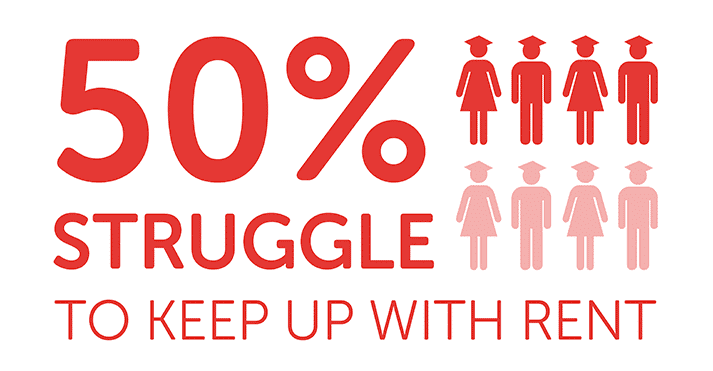
On top of this, three in five students in the survey told us that their health has taken a hit due to rent costs, while over two in five have found that their studying has been negatively impacted.
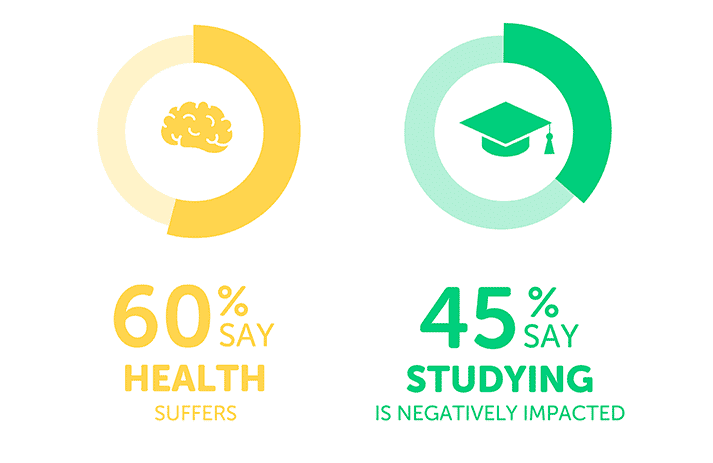
In particular, students have talked about the impact that issues with accommodation are having on their mental health:
- Having to work to pay rent and study for uni amidst a global pandemic has been really hard on my mental health. (Private landlord)
- It's a lot of money. And at the moment I can't even be there and so much money is coming out my pocket. My rent is twice as much as my loan. I can't afford it [...] I'm trying to do things for money but it's hard when I have so many deadlines. (Private halls)
- Although four of us pay bills I'm the only one who moved in. Living [alone] in a big house isn't what I planned, it's been extremely lonely. [...] I've been alone for six months and it's been incredibly hard on my mental health. (Private landlord)
- There is little to no mental health or wellbeing support on offer and we are unable to contact our residential support officers. Also the security have failed to break up parties during the pandemic which is concerning. (Uni accommodation)
How do students pay their rent?
With so many students finding rent to be unaffordable, where do they go to find the extra money?
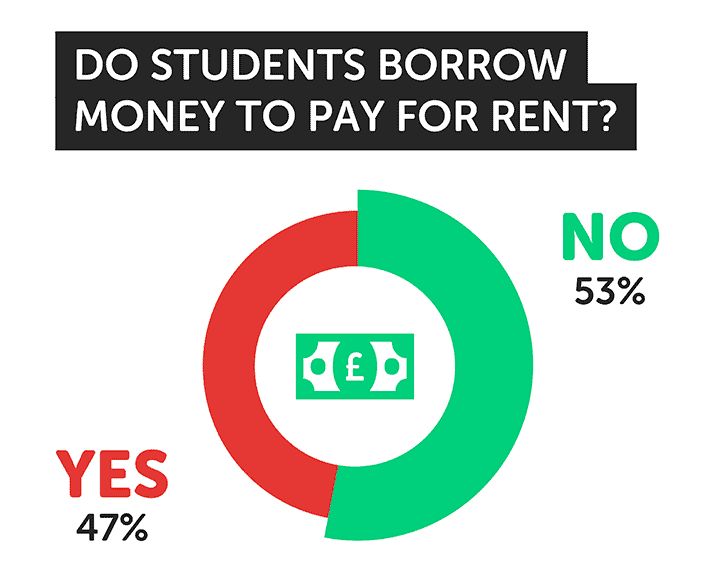
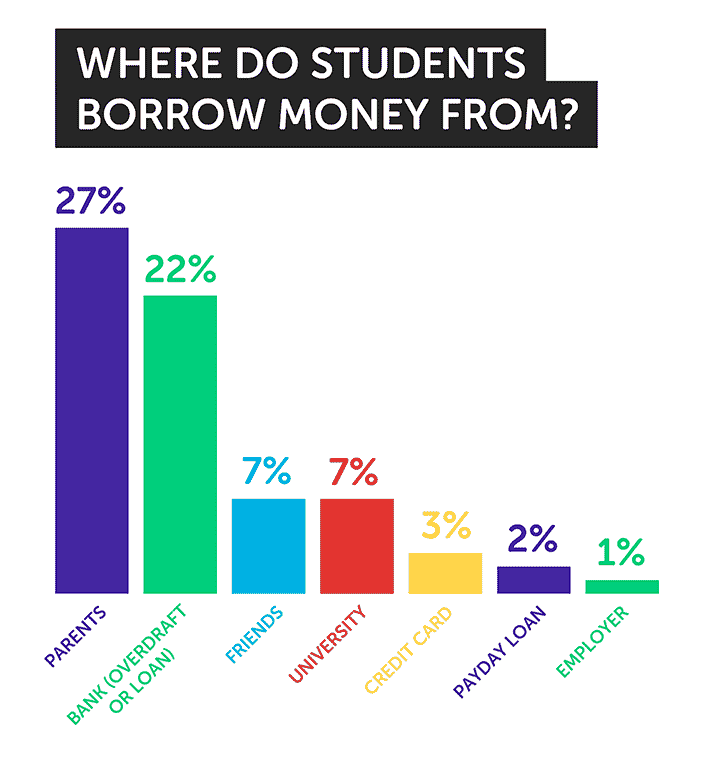
Out of the students who have borrowed or received money to cover rent, the most common way to do so is by asking parents for money. However, this figure is down quite significantly from 37% in 2020.
This could be due to students receiving rent refunds and spending less on living costs like food and bills if they are living at home instead of their uni accommodation. However, it's also possible that fewer parents feel able to support their children with the cost of rent.
The coronavirus pandemic has had a financial impact on many people, including students and the parents of students, with high numbers of workers facing furlough or redundancy. This could make it harder for students to cover rent, and for their parents to lend them money.
Here's how much parents are currently giving students to help cover their rent...
How much do parents pay?
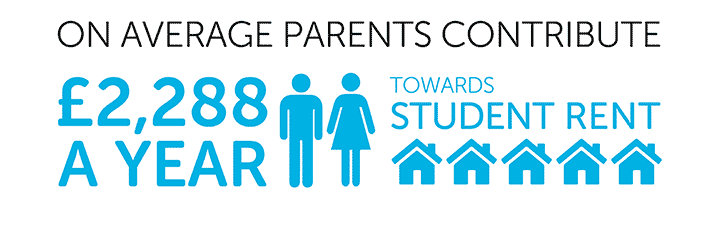
On average, parents are giving their children at uni £44 per week for rent. This would add up significantly throughout the year, costing as much as £2,288 over a 12-month period.
What issues do student renters face?
Students report a huge range of issues with their accommodation. Below, we'll go through the most common problems students have with housemates, and with their properties.
Biggest problems with housemates
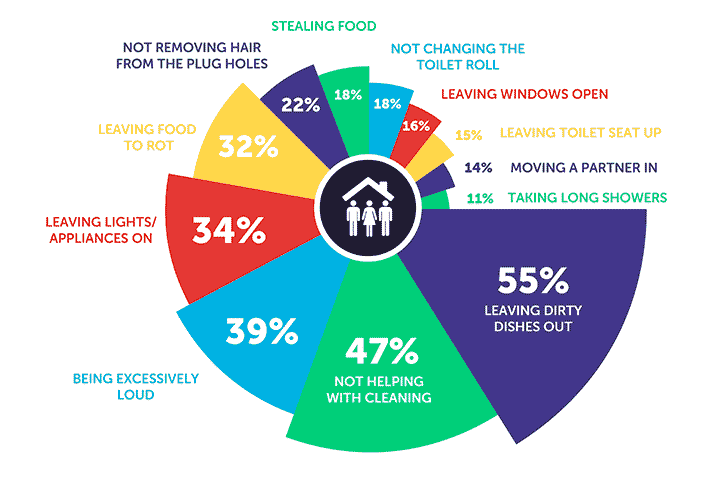
For a lot of students, cleanliness is a pretty big cause of frustration in their house, with 55% saying their housemates leave dirty dishes out, and 47% saying others don't help with cleaning.
On top of this, around a third of students in the survey said their housemates leave food out to rot.
Biggest problems with properties
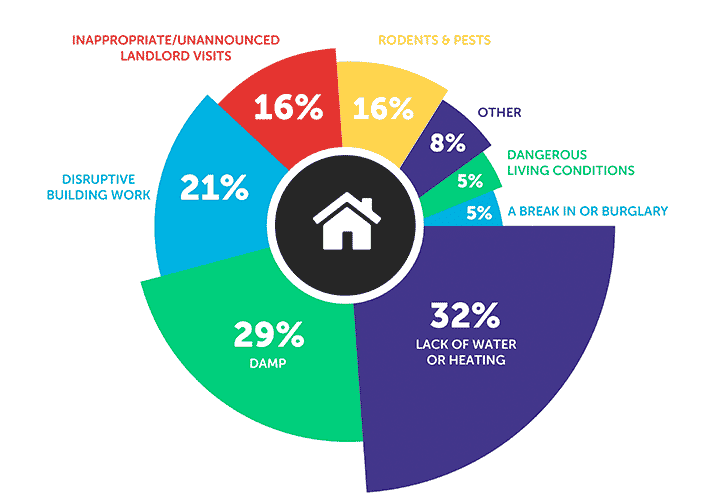
Particularly this year, with so many students needing to study from home, it's important that their accommodation is safe and comfortable. But unfortunately, this isn't always the case.
Among the most common concerns students had about their accommodation was having a lack of water or heating, having damp, and dealing with disruptive building work. And, on top of this, 16% said that they had inappropriate or unannounced visits from their landlords, which should never be the case.
Here are some of the most shocking complaints we heard about student housing:
- Our basin of the sink fell off the wall, and the whole flat and downstairs flat flooded. (Uni accommodation)
- Finding a glass of orange juice that was turned to hard green mush hidden behind the microwave. (Private landlord)
- The electric lock on the main door into the flat wouldn't work, so their solution was to remove it entirely for a few days allowing anyone to walk in and have access to the kitchen (or bedrooms if they were not also locked by students). (Uni accommodation)
- Kitchen window leaked, maintenance came in without knocking and had been to other flats before ours with people who had tested positive for COVID living there, brought COVID to our flat and I tested positive two weeks later, kitchen window was never fixed. (Private halls)
- Housemate sick on corridor carpet – took them a while (days) to get round to clean it. (Uni accommodation)
- I had to go to the police as someone with a key broke into my place and hid in the wardrobe and that is when I found out that all the staff have master keys to unlock any door. Prints were left, however, the person wasn't found so now it is scary and I have PTSD and I am worried within my own 'safe' room. (Private halls)
How long does it take to get problems sorted?
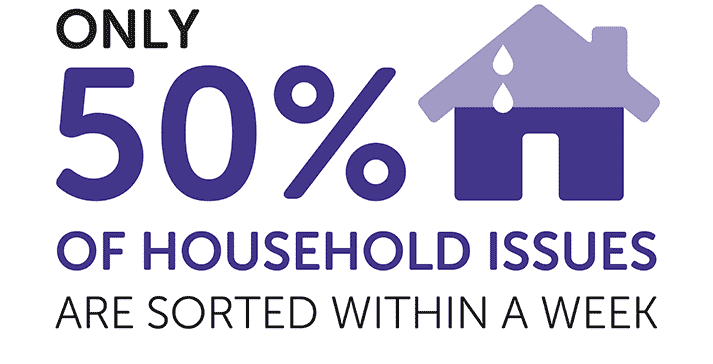
It was really concerning to see that, for half of the students in the survey, it took over a week for problems with their property to get sorted. Not only this, but 5% said that the problems with their housing have never been fixed.
As we've already seen, the majority of students find that the pressures of renting impact their health. If issues go unresolved within the house, this will only make the living situations harder.
Where do student tenants go for support when needed? For the majority, their parents are the ones they turn to:
Is student housing worth the spend?
One noticeable shift from last year is the drop in students who view their accommodation as good value for money – down by as much as 10%.
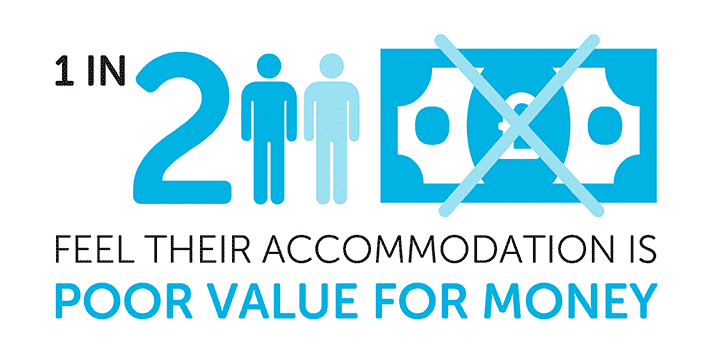
It's really concerning to think of so many students feeling as though their accommodation isn't worth the money they spend on rent. But, sadly, it's not wholly surprising this year, given that so many have been unable to actually live in their rented properties for the whole academic year.
Students have told us about how much they feel they have got for their money this year as renters:
- I hate it because it isn't good value for money. It's small, cramped, dangerous, full of antisocial people and the management do not care about problems at all. We had a bug infestation from previous students and it took them four days to come out [...] and we haven't heard back about a partial refund. (Uni accommodation)
- £6,000 is a lot of money – so knowing that I've paid it for a service I'm not using is stressful. (Private landlord)
- The staff are lovely and always have a laugh with you, they also handle issues really well and the accommodation is great value for money. (Uni accommodation)
- I love my accommodation (parents' home) as it's free and comes with homemade meals albeit at the cost of 100% quiet time. I much prefer living at home as I had major homesickness in first year. (With parents/guardians)
- I think it is completely absurd to be paying full rent when I can't use all the facilities I am paying for. (Private halls)
What do the experts say?
Save the Student
Jake Butler, Save the Student's money expert, says:
£1 billion is a huge price for students to pay and the total will keep going up, making it clear once again that students are among the worst affected by the coronavirus pandemic.
You can see from our stats that students feel let down and helpless when it comes to looking for support with their accommodation costs.
A lot of accommodation providers, particularly universities, have reacted well but many students, mostly those renting from private landlords, have been left without a leg to stand on.
Time and time again the government has promised to look at the poor situation students are in but we're yet to see any effective action. I would urge the government to work with landlords and universities to offer students financial support to cover any rent payments for accommodation that cannot be accessed.
NUS
Hillary Gyebi-Ababio, NUS Vice President for Higher Education, adds:
Students have been consistently exploited and ignored during this pandemic.
We are seen as cash cows, with many stuck paying extortionate rents for properties they either cannot use or cannot afford.
This survey makes clear that the £50million in hardship funding is a drop in the ocean compared to the eye-watering costs that students are facing. If Westminster did the right thing and matched the hardship funding being made available in Wales for students, the amount needed would be more than £700 million.
COVID-19 has exposed and exacerbated fundamental flaws in the student housing sector but there are deeper problems rotting at the core. We have inherited Student Finance and student housing systems that see students as pound signs rather than people.
Student housing resources
Want to save more and stress less about student housing? Our most popular guides about accommodation walk you through the essentials:
- Student rent calculator
- Parental contribution calculator
- National Student Money Survey
- How to save money on renting.
About the National Student Accommodation Survey 2021
Want to know more about the survey, or need case studies, comments or quotes? We're happy to help – just drop us a line.
You're welcome to reference or re-use data from the survey with credit and a link back to the site: "Source: The National Student Accommodation Survey 2021 / www.savethestudent.org"
Survey polled 1,355 students in the UK between 20th January 2021 and 8th February 2021.

